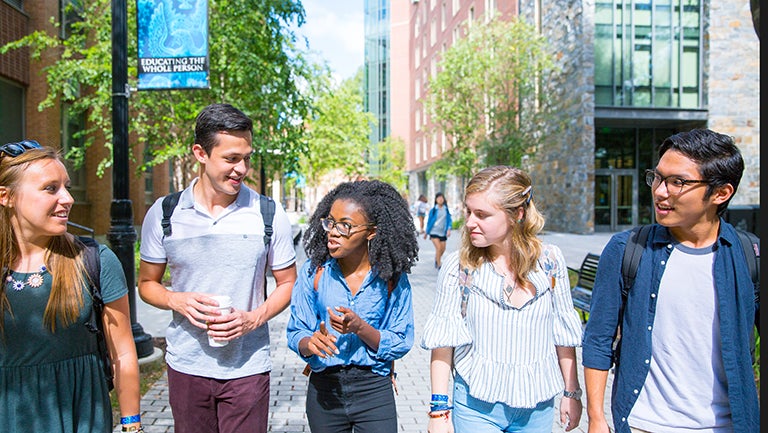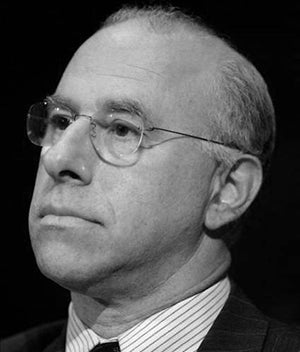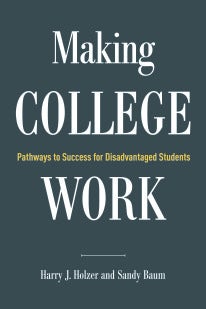Title: Academic, Financial Support Critical to Low-Income and Minority Student Success
A recent book co-authored by Georgetown professor Harry Holzer shows that low-income and minority students are far more likely to complete their degrees at colleges and universities that provide academic and financial support.

Low-income and minority students are far more likely to complete their degrees at colleges and universities that provide academic and financial support, according to a recent book co-authored by Georgetown professor Harry Holzer.
As part of an event during the yearlong recognition of the 50th anniversary of Georgetown’s Community Scholars Program’s (CSP), Holzer and his co-author spoke about Making College Work: Pathways to Success for Disadvantaged Students (Brookings Institution, 2017).

“When students attend the higher-quality, high-resource institutions, their completion rates are higher,” says Holzer, the McCourt School of Public Policy’s LaFarge SJ Professor and former chief economist for the U.S. Department of Labor. “This tells us that whenever possible, we’ve got to improve their access to such institutions.”
The book finds that low-income and minority students have lower completion rates than higher-income or white students at all institutions, and these rates are particularly low at institutions that do not have as robust financial or academic resources.
Educational Recommendations
Among the book’s other recommendations are to increase efforts to help high school students to pick the right college; increase support systems for so-called “disadvantaged” students after they are enrolled; strengthen occupational training at community colleges; and improve alignment between programs in two- and four-year colleges on the state level.
Holzer authored the book with Sandy Baum, an education policy consultant at the Urban Institute and Skidmore College professor emerita.
Despite the higher cost of attendance, the book finds that academic and financial support services offered at many four-year institutions often produce better outcomes for low-income and minority students.
Guiding Students Imperative
Students attending two-year schools typically intend to transfer to four-year institutions and get BAs, but only about 12 percent do so, Holzer explains.
“On the other hand, many of these students also won’t make it at four-year colleges, and for them, the best options are strengthening their opportunities at a community college,” he explains.

The book also recommends that more federal and state funding go to community colleges, but that such funding be targeted for programs that prepare students for good-paying jobs.
“…Just telling people to go to college and set their sights as high as possible, and working to diminish the financial barriers they face, is not a viable strategy,” the book concludes. “We must guide students into programs that are most likely to provide them with valuable credentials.”
CSP and GSP
CSP is one of Georgetown’s many programs and policies that support low-income, minority and first-generation students. CSP, located within the university’s Center for Multicultural Equity and Access, serves a cohort of diverse college students – many of whom are first generation – and offers a five-week academic summer program before entering the university.
Once students begin their academic career, the program supports students with academic advising, mentoring, personal counseling, study groups, workshops and seminars.
Once classes begin, these students also join a larger cohort of students in the Georgetown Scholarship Program (GSP), with a 96 percent graduation rate, that provides mostly first-generation students with access to an alumni network, career assistance, mentoring programs and activities, as well as medical bill coverage and emergency funds for necessities such as groceries during college breaks.
The university, which graduates more than 94 percent of its students over six years, also has admissions and financial aid policies that guarantee the full need of eligible students – regardless of their ability to pay – through a combination of grants, work-study and loans.
American Talent Initiative
Georgetown is a founding member of the American Talent Initiative (ATI), a collaboration among the Aspen Institute’s College Excellence Program, Ithaka S+R and dozens of colleges and universities dedicated to substantially expanding opportunities and access for low- and moderate-income students.
ATI seeks to significantly expand the number of talented low- and moderate-income students at America’s top-performing undergraduate institutions with the highest graduation rates.
Member institutions must have produced graduation rates of at least 70 percent over six years.
Students’ Advantage
Holzer and Baum’s book suggests that colleges should continue to invest in programs that support so-called “disadvantaged” students after they are admitted.
“The idea that colleges and universities can step in when people are either 18 years old or older and do some magic that’s going to make it as though they never had the circumstances that they faced for the first 18 years of their lives – that’s not realistic,” Baum says.
Elizabeth Velez (G’83), former academic advisor for CSP and a professional lecturer in Georgetown’s Women’s and Gender Studies Program, took issue at the event with the word “disadvantaged.”
“Our students come in with more ambition, more desire to learn, are more motivated and more able to understand the resources that they need than any student I have ever seen,” said Velez, who has been involved with the program for 38 years. “There are ways in which the hunger that they have to learn has advantaged them, not disadvantaged them.”